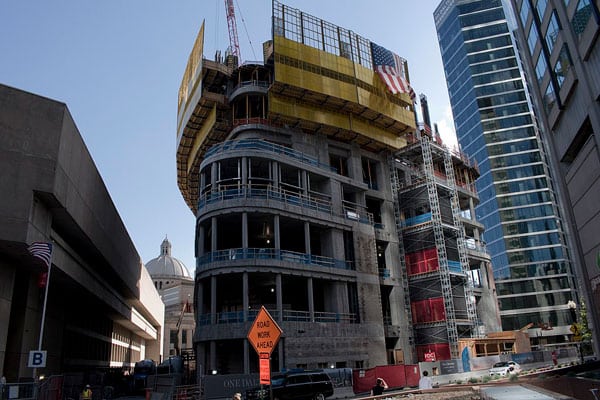
September 11, 2018; WBUR
“Boston’s past and current city administrations have permitted an explosion in luxury real estate property construction that is reshaping the city’s skyline and economic composition,” write Chuck Collins and Emma de Goede in a report titled Towering Excess: The Perils of The Luxury Real Estate Boom for Bostonians, published by the Institute of Policy Studies (IPS), a nonprofit think tank. “With thousands of new luxury units either under construction or seeking permits, city officials ought to be seriously exploring the perils these units pose.”
As Simón Rios reports for WBUR, a Boston public radio station, “The study looks at 1,805 units with an average price of $3 million.” Looking at the dates of construction of these buildings, it appears that many luxury buildings are built toward the end of economic booms and often open shortly after economic crashes. One of the twelve buildings Collins and de Goede examine opened in 1982 (itself the end of a recession). Four opened in 2000 and 2001 (i.e., after the bust of the 1990s dot-com boom), then another three opened in 2008 and 2009 (at the start of the Great Recession). In recent years (2013-2016), three have opened and one other has expanded.
Now, as NPQ’s Kelly Phipps observed, a host of new luxury buildings in Boston is expected. The IPS report identifies 17 potential properties and more than 3,000 units of housing. But how big is the market for $3-million condominiums? Is Boston’s elite that flush?
This is where things start to get interesting. As it turns out, most luxury condo units are not bought by New Englanders. An editorial in the Boston Business Journal explains that “many of these condos are used by wealthy elites overseas as vehicles to store wealth, rather than as full-time housing. Further, more than a third of the units in those projects are owned by limited liability corporations (LLCs) or trusts that obscure the real owners.”
In fact, Collins and de Goede report that only 650 or so (36 percent) of the 1,805 condo owners claim a residential tax break. The other 64 percent of the units are either rented out, secondary residences, or investment vehicles. The result, they note, is the emergence of “towns [that] have no stoop life, less foot traffic, fewer customers for neighborhood businesses, and weakened neighborly bonds.” De Goede remarks that she “was surprised by the lack of residency in luxury buildings that are promoted as ‘communities in the sky’…these buildings are far more comparable to ghost towns than they are to integrated communities.”
It is all perfectly legal, although Collins and de Goede caution that cash real estate transactions can be used to launder illicit gains. “We spot-checked some of those buildings and found there were large numbers of cash purchases by shell corporations, which is sort of a red flag for possible use of illicit funds,” Collins tells Rios.
Sign up for our free newsletters
Subscribe to NPQ's newsletters to have our top stories delivered directly to your inbox.
By signing up, you agree to our privacy policy and terms of use, and to receive messages from NPQ and our partners.
Meanwhile, 52.5 percent of Boston area renters and 35.8 percent of homeowners are presently “housing cost burdened,” with over 30 percent of their income going to housing expenses. And 21 percent of Bostonians spend more than half of their income on housing.
Every fall, Northeastern University publishes its Greater Boston Housing Report Card. In its 2017 report, authors Barry Bluestone and James Huessy note that, “In the period 1996 to 2003, more than 39 percent of all permits were for affordable units [but] since 2011 the proportion has fallen to about 18 percent.”
The city of Boston invests in affordable housing, funded in part by linkage fees assessed on market-rate developments. “The luxury units are giving us a ton of cash to create affordable housing through the city,” says city housing director Sheila Dillon.
But as NPQ has noted, a focus on production can mask larger trends. Nonprofit advocates would do well to promote—and city leaders to implement—policies that foster a healthier housing market. No matter how much new affordable housing you build, it’s hard to keep housing affordable when the median price of housing in some Boston low-income neighborhoods increased by over 50 percent between 2010 and 2015. Overall, concludes Renée Loth in the Boston Globe, construction “is not solving the housing affordability problem.” The Boston Business Journal editorial board concurs:
None of this [the report’s findings] is news to those in the business community—especially in real estate—who’ve watched over the past two decades as the city’s developers have increasingly catered to mega-rich, international buyers. Meanwhile, the city’s workforce is being forced to live farther and farther from the city, and endure longer and longer commutes, crowded out by projects like Millennium Tower and One Dalton.
In their report, Collins and de Goede make a number of recommendations, including taxing luxury housing. The Boston Business Journal writes that, “While we’re always reluctant to embrace a new tax, the need to ensure an adequate workforce to fuel Boston’s growth is a bigger concern in this case. City housing experts agree that a tax on real estate transactions on properties selling for upwards of, say, $2.5 million, or some kind of tax on vacant condos—with the proceeds dedicated to building affordable housing—may well be…needed.”—Steve Dubb













